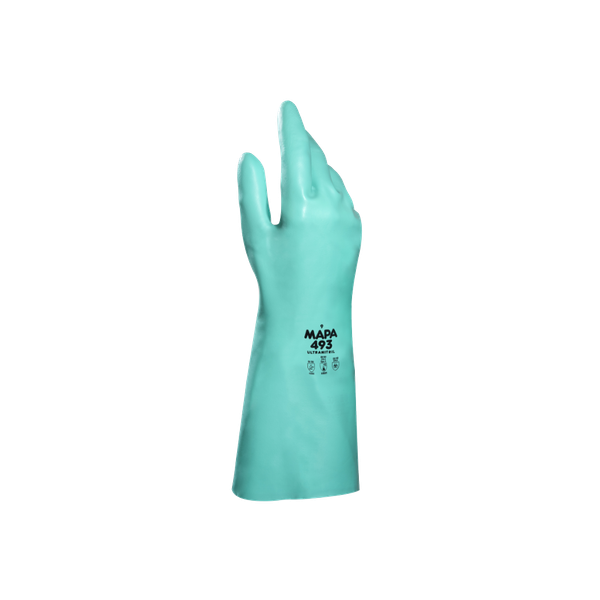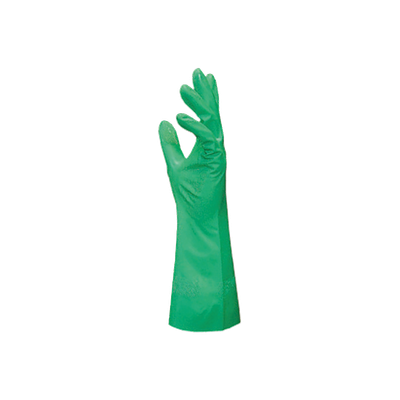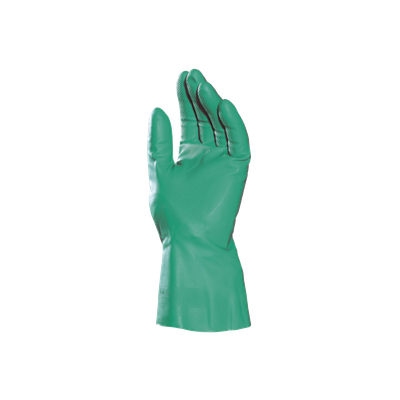StanSolv AF-493
Ultra-long chemical protection
-
CAT. 3
 0334
0334
-
 4102X
4102X
-
Type A
 AJKOPT
AJKOPT
-

-

Specific advantages
 Durability
Durability
- Longer service life: excellent mechanical resistance (abrasion, perforation)
 Productivity
Productivity
- Good grip on slippery objects, due to the embossed texture
 Skin protection
Skin protection
- Excellent protection during intensive handling of high-risk chemical products
 Guaranteed quality
Guaranteed quality
- In compliance with guideline for requirements concerning personal protective equipment in plant protection according to BVL (Bundesamt für Verbraucherschutz und Lebensmittelsicherheit)
- Silicone free to prevent traces, defects on metal sheet and glass prior to painting
 Care for the environment
Care for the environment
- Optimised individual packaging to limit plastic waste
- Recycled material in the packaging: 30 %
Applications
Automotive/mechanical industry
- Treating/degreasing metals with aggressive solvents
Chemical industry
- Handling drums of chemical products
Other industries
- Application of pesticides
- Cleaning of printing-press rollers
- Maintenance
- Timber treatment and finishing
Agriculture sector
- Spray mixtures preparation
- Pesticides handling
- Tank filling
- Application & spreading of pesticides
- Pesticides waste management
- Treatment equipment cleaning
Product detail
| Material | Nitrile |
|---|---|
| Colour | green |
| Interior finish | Flocked |
| Exterior finish | Embossed texture |
| Length (cm) | 39 |
| Thickness (mm) | 0.55 |
| Size | 8 9 10 11 |
| Packaging | 1 pair/bag 10 pairs/bag 50 pairs/carton |
Chemical chart
OVERALL CHEMICAL PROTECTION RATING
Protection rating is determined by taking into account the effects of both permeation and degradation in an attempt to provide users with an overall protection guideline when using our glove products against specific chemicals.
Meaning of the colours :
Used for high chemical exposure or chemical immersion, limited to breakthrough time based on a working day.
Used for repeated chemical contact, limited to total chemical exposure i.e. : accumulative breakthrough time based on a working day.
Splash protection only, on chemical exposure the gloves should be discarded and new gloves worn as soon as possible.
Not recommended, these gloves are deemed unsuitable for work with this chemical.
NT: Not tested
NA: "Not applicable" because not fully tested (only degradation OR permeation results)
The chemical test data and overall chemical protection rating should not be used as the absolute basis for glove selection. Actual in-use conditions may vary glove performance from the controlled conditions of laboratory tests. Factors other than chemical contact time
| Chemical Product | CAS # | Breakthrough time (minutes) |
Permeation level |
Standard | Degradation level |
Rating |
|---|---|---|---|---|---|---|
| 1,1,1-Trichloroethane 99% | 71-55-6 | 54 | 2 | EN 374-3:2003 | 1 |
|
| 2-Propanol (Isopropanol) 99% | 67-63-0 | >480 | 6 | EN 374-3:2003 | 4 |
|
| Ammonium hydroxide solution 25% | 1336-21-6 | >480 | 6 | EN 16523-1:2015 | 4 |
|
| Butyl Acetate 99% | 123-86-4 | 51 | 2 | EN 374-3:2003 | 1 |
|
| Cyclohexane 99% | 110-82-7 | >480 | 6 | EN 374-3:2003 | 4 |
|
| Cyclohexanone 99% | 108-94-1 | 88 | 3 | EN 374-3:2003 | 1 |
|
| Dichloromethane (Methylene Chloride) 99% | 75-09-2 | 2 | 0 | EN 374-3:2003 | 1 |
|
| Diethylamine 98% | 109-89-7 | 51 | 2 | EN 16523-1:2015 | 1 |
|
| Dimethylformamide 99% | 68-12-2 | 15 | 1 | EN 16523-1:2015 | 1 |
|
| Ethanol 95% | 64-17-5 | 235 | 4 | EN 374-3:2003 | 3 |
|
| Formaldehyde 37% | 50-00-0 | >480 | 6 | EN 16523-1:2015 | 4 |
|
| Hydrogen peroxide 30% | 7722-84-1 | >480 | 6 | EN 16523-1:2015 | 4 |
|
| Methanol 99% | 67-56-1 | 106 | 3 | EN 16523-1:2015 | 2 |
|
| Methanol 99% | 67-56-1 | 41 | 2 | EN 16523-1:2015 | 2 |
|
| Methyl Ethyl Ketone (2-Butanone) 99% | 78-93-3 | 7 | 0 | EN 374-3:2003 | 1 |
|
| n-Heptane 99% | 142-82-5 | >480 | 6 | EN 16523-1:2015 | 4 |
|
| N-N dimethyl acetamide 99% | 127-19-5 | 18 | 1 | EN 374-3:2003 | 1 |
|
| n-undecane 99% | 1120-21-4 | >480 | 6 | EN 374-3:2003 | NT |
|
| Propylene Glycol 99% | 57-55-6 | >480 | 6 | EN 374-3:2003 | NT |
|
| Propylene Glycol Methyl Ethyl Acetate (PGMEA) 99% | 108-65-6 | 183 | 4 | EN 374-3:2003 | NT |
|
| Propylene Glycol Monomethyl Ether 99% | 107-98-2 | 360 | 5 | EN 374-3:2003 | 4 |
|
| Sodium hydroxide 20% | 1310-73-2 | >480 | 6 | EN 374-3:2003 | 4 |
|
| Sodium hydroxide 40% | 1310-73-2 | >480 | 6 | EN 16523-1:2015 | 4 |
|
| Sodium hydroxide 50% | 1310-73-2 | >480 | 6 | EN 374-3:2003 | 4 |
|
| Styrene 99% | 100-42-5 | 16 | 1 | EN 16523-1:2015 | 1 |
|
| Sulfuric acid 96% | 7664-93-9 | 184 | 4 | EN 16523-1:2015 | 1 |
|
| Tetrachloroethylene (Perchloroethylene) 99% | 127-18-4 | 176 | 4 | EN 374-3:2003 | 3 |
|
| Toluene 99% | 108-88-3 | 31 | 2 | EN 16523-1:2015 | 1 |
|
| Xylene 99% | 1330-20-7 | 56 | 2 | EN 374-3:2003 | 2 |
|
*not normalized result







